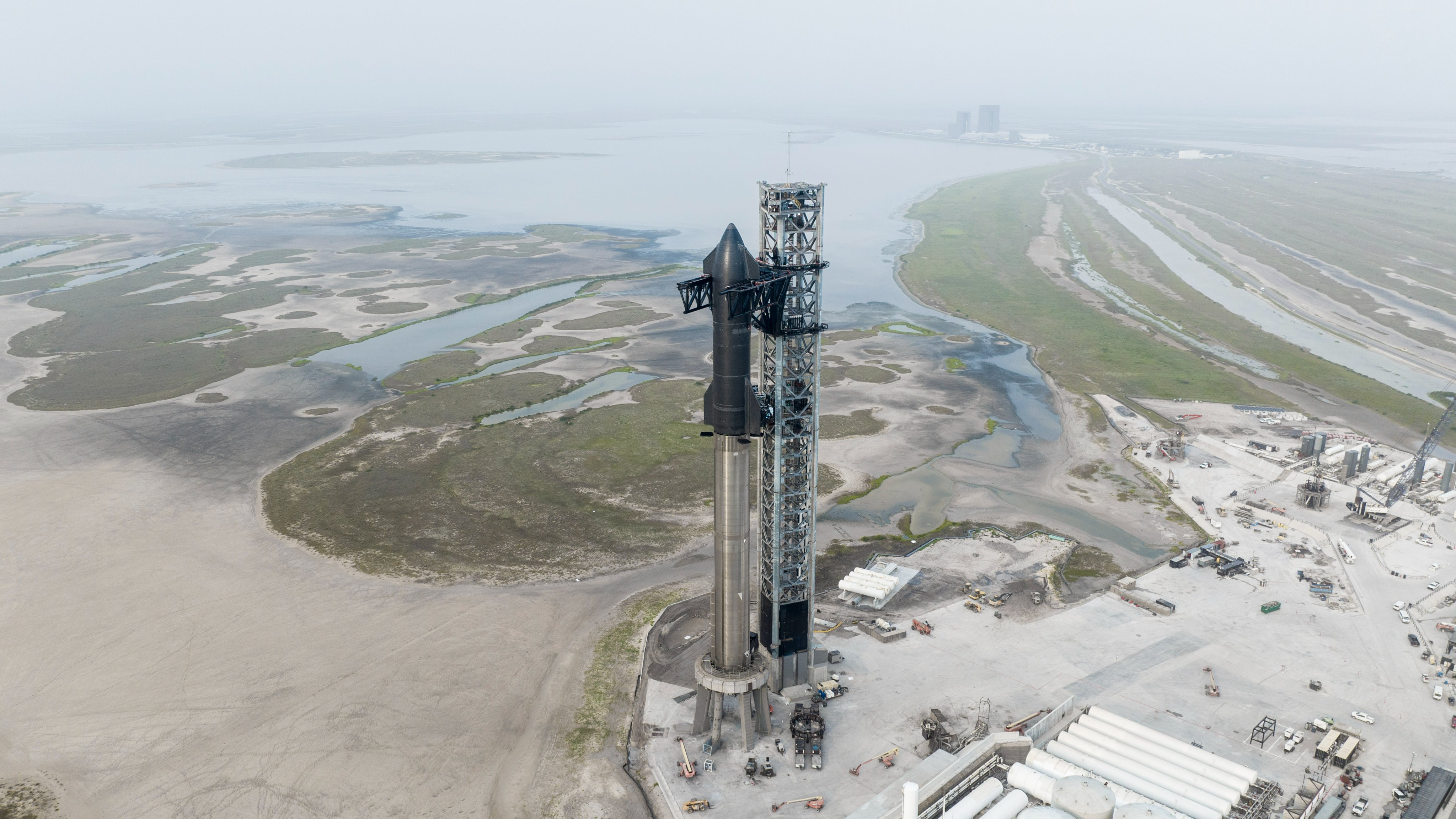
SpaceX's huge Starship vehicle could launch on its first-ever orbital test flight by the end of next week, if all goes according to plan.
SpaceX has been gearing up for the pioneering flight for months, and the prep work has accelerated recently. Last week, for example, technicians stacked the spacebound Starship, placing its Ship 24 upper-stage prototype atop its Booster 7 first stage on the orbital launch mount at Starbase, SpaceX's South Texas facility.
Such activity implies that Starship is in the home stretch, and SpaceX founder and CEO Elon Musk has repeatedly reinforced that notion via Twitter. He did so again on Monday (April 10), stressing that launch could be less than two weeks away.
"Starship launch trending towards near the end of third week of April," Musk tweeted on Monday morning.
Related: SpaceX's Starship looks amazing stacked for launch in these photos
Musk didn't give a more specific date range, but he may well be targeting April 20, which is a holiday for cannabis culture. The billionaire entrepreneur likes making 4/20 references and jokes, and he gave an apparent nod to the possibility of an April 20 launch in a tweet last month.
SpaceX isn't entirely in control of the schedule, however: The company is still waiting on an orbital launch license from the U.S. Federal Aviation Administration. So you probably shouldn't book any flights to South Texas just yet.
Get the Space.com Newsletter
Breaking space news, the latest updates on rocket launches, skywatching events and more!
SpaceX is developing Starship to take people and cargo to the moon, Mars and beyond. The enormous vehicle is designed to be fully reusable, a breakthrough that Musk believes will usher in a spaceflight revolution.
Starship's Super Heavy first stage is powered by 33 of SpaceX's new Raptor engines, while the upper-stage spacecraft, known as Starship, sports six Raptors. Those 33 first-stage engines will generate about 16.5 million pounds of thrust at liftoff, meaning Starship will become the most powerful rocket in history when it flies successfully for the first time.
The current record is held by NASA's Space Launch System (SLS) megarocket, which produces about 8.8 million pounds of thrust at liftoff. The SLS debuted in November 2022, launching for the first time on NASA's Artemis 1 moon mission.
Starship is also the biggest rocket ever built, standing 394 feet (120 meters) tall when fully stacked. But it's going to get even bigger, Musk revealed recently.
"Ship will probably stretch by another 10m or so," he tweeted on Saturday (April 8).
Mike Wall is the author of "Out There" (Grand Central Publishing, 2018; illustrated by Karl Tate), a book about the search for alien life. Follow him on Twitter @michaeldwall. Follow us on Twitter @Spacedotcom or Facebook.
Join our Space Forums to keep talking space on the latest missions, night sky and more! And if you have a news tip, correction or comment, let us know at: community@space.com.

Michael Wall is a Senior Space Writer with Space.com and joined the team in 2010. He primarily covers exoplanets, spaceflight and military space, but has been known to dabble in the space art beat. His book about the search for alien life, "Out There," was published on Nov. 13, 2018. Before becoming a science writer, Michael worked as a herpetologist and wildlife biologist. He has a Ph.D. in evolutionary biology from the University of Sydney, Australia, a bachelor's degree from the University of Arizona, and a graduate certificate in science writing from the University of California, Santa Cruz. To find out what his latest project is, you can follow Michael on Twitter.
-
mcswell C'mon, FAA, the Senate Launch System already launched, so there's no political reason to delay the certification for the bigger and better Starship any longer.Reply -
George² Reply
But Musk said about percentage of probability of success more delays bigger percentage. Not with this words but... :Dmcswell said:C'mon, FAA, the Senate Launch System already launched, so there's no political reason to delay the certification for the bigger and better Starship any longer.









